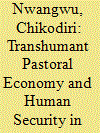| Srl | Item |
| 1 |
ID:
182466


|
|
|
|
|
| Summary/Abstract |
Health burden, coping strategies and access to public healthcare facilities are examined using a medical ecological approach and ethnography among Ibarapa nomads. They live in bands in far distances from Yoruba populated towns in the Ibarapa area, where grazing culture makes healthcare facilities inaccessible. Vulnerable to high morbidity and health risks due to snake-bites, malaria, zoonosis and some other infections, but lacking healthcare facilities, they mostly use faith-based healing, herbal remedies and self-medications. Seventeen percent of the nomads access healthcare facilities from distant towns in Ibarapa. Equitable access to healthcare requires mobile healthcare for semi-sedentary nomads and permanent health clinics for sedentary nomads.
|
|
|
|
|
|
|
|
|
|
|
|
|
|
|
|
| 2 |
ID:
175107


|
|
|
|
|
| Summary/Abstract |
The limited access to land in most African states has engendered a fierce competition, especially among various agricultural user groups. The two major groups of agricultural land users are transhumant pastoralists and sedentary peasant farmers. The internecine conflict between these agro-user groups has grave implications for human security in Nigeria and beyond. Explanation of the conflict has centred on climate change and environmental security, population growth and urbanisation, and insecurity. However, the transnational character of this conflict, often made possible by relevant regional protocols, has not received adequate scholarly attention. This paper argues that networking of regional bodies and other stakeholders is the panacea for tackling the tension-soaked relationship between these land users.
|
|
|
|
|
|
|
|
|
|
|
|
|
|
|
|